Key takeaways:
- Self-evaluation leads to better understanding of personal strengths and weaknesses, boosting confidence and resilience.
- Dyslexia training should be individualized and include emotional support, fostering a sense of control and ownership over learning.
- Key skills for effective dyslexia training include adaptability, patience, and clear communication of strategies.
- Maintaining a learning journal and seeking feedback can enhance self-evaluation and personal growth.
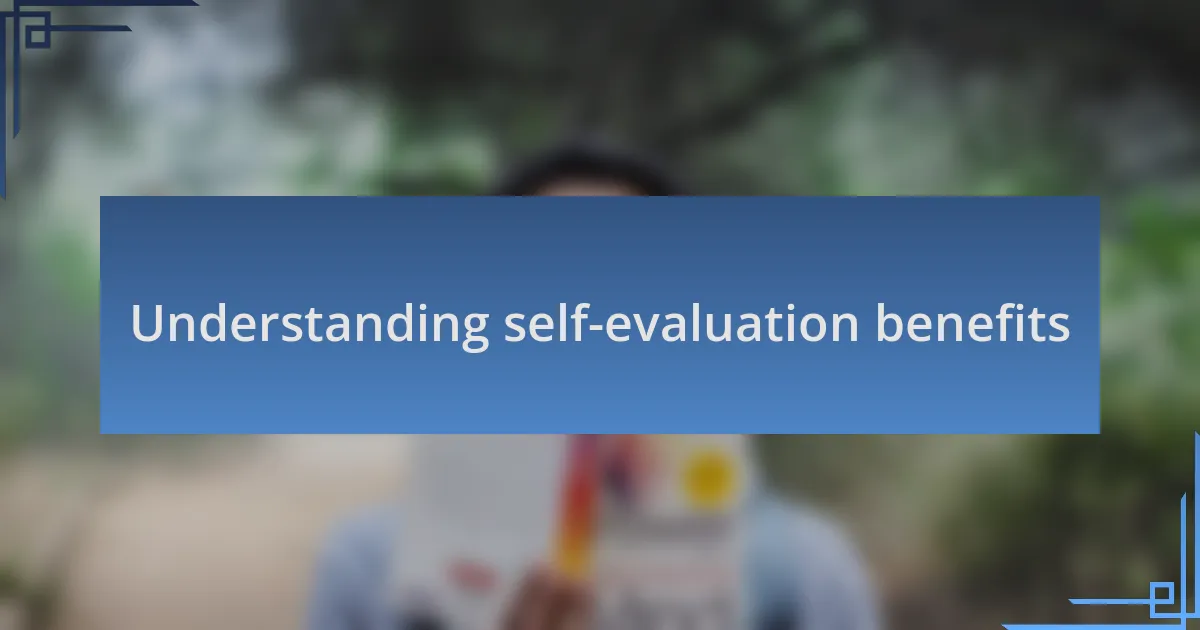
Understanding self-evaluation benefits
Self-evaluation is a powerful tool for personal growth, especially for individuals working through learning challenges like dyslexia. Reflecting on my own experiences, I remember the moment I assessed my learning strategies and realized some were holding me back. Asking yourself, “What can I do differently?” can be the catalyst for profound change.
One significant benefit of self-evaluation is gaining a clearer understanding of personal strengths and weaknesses. I’ve found that identifying what works for me—like using visual aids for reading—makes the learning process more manageable. This realization not only boosts confidence but also motivates me to explore new methods, igniting a passion for continuous learning.
Furthermore, self-evaluation fosters resilience. When I faced obstacles, taking time to evaluate my reactions allowed me to see setbacks as stepping stones rather than failures. Have you ever felt overwhelmed by your learning journey? That pause to reflect can illuminate paths forward that you may not have considered before, turning struggles into opportunities for success.
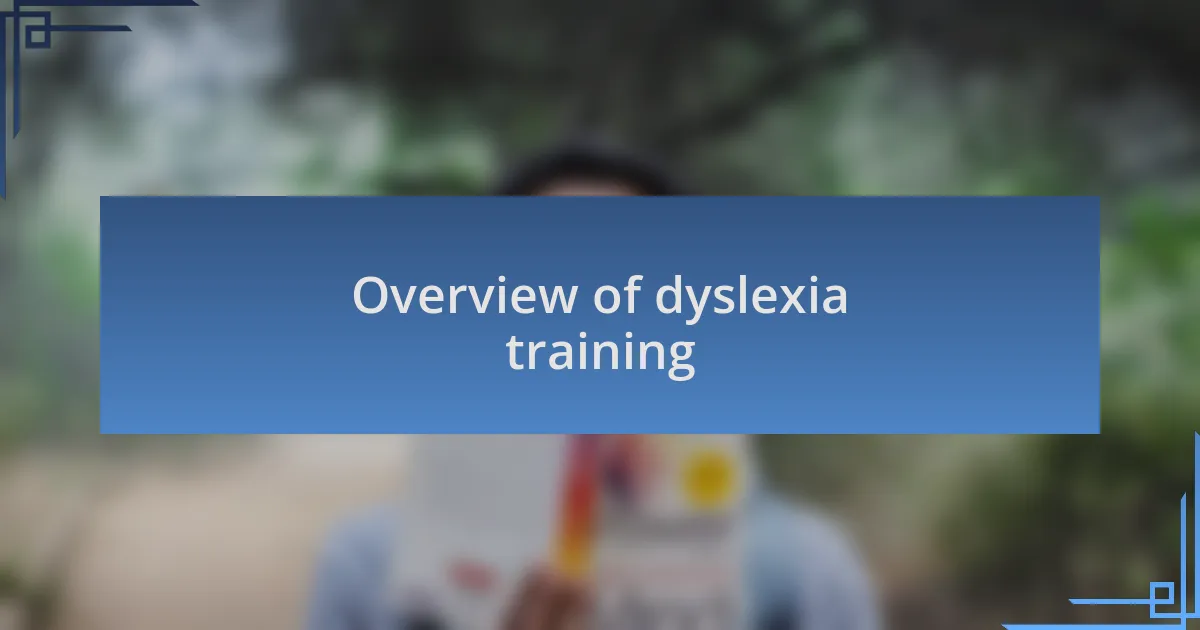
Overview of dyslexia training
Dyslexia training encompasses a variety of methods designed to enhance reading and comprehension skills for individuals overcoming learning challenges. From my experience, structured programs often blend phonics instruction with multisensory techniques, which can make all the difference. For instance, when I was introduced to the Orton-Gillingham approach, I saw a significant shift in my ability to decode words, leading me to feel more in control of my learning.
One key component of dyslexia training is individualized learning plans that cater to each person’s unique needs. I remember sitting down with an instructor to map out my strengths and challenges, which helped us tailor strategies specifically for me. This personalized attention made me realize that my journey is just that—my own. Have you ever experienced training that felt like it was made just for you? It’s a game-changer.
Additionally, the emotional support inherent in dyslexia training cannot be overstated. I often found myself frustrated, questioning my abilities, but having an understanding coach who acknowledged those feelings helped me stay motivated. This support can be invaluable, reminding us that we are not alone in our struggles and that growth is always possible, even when the path feels steep.
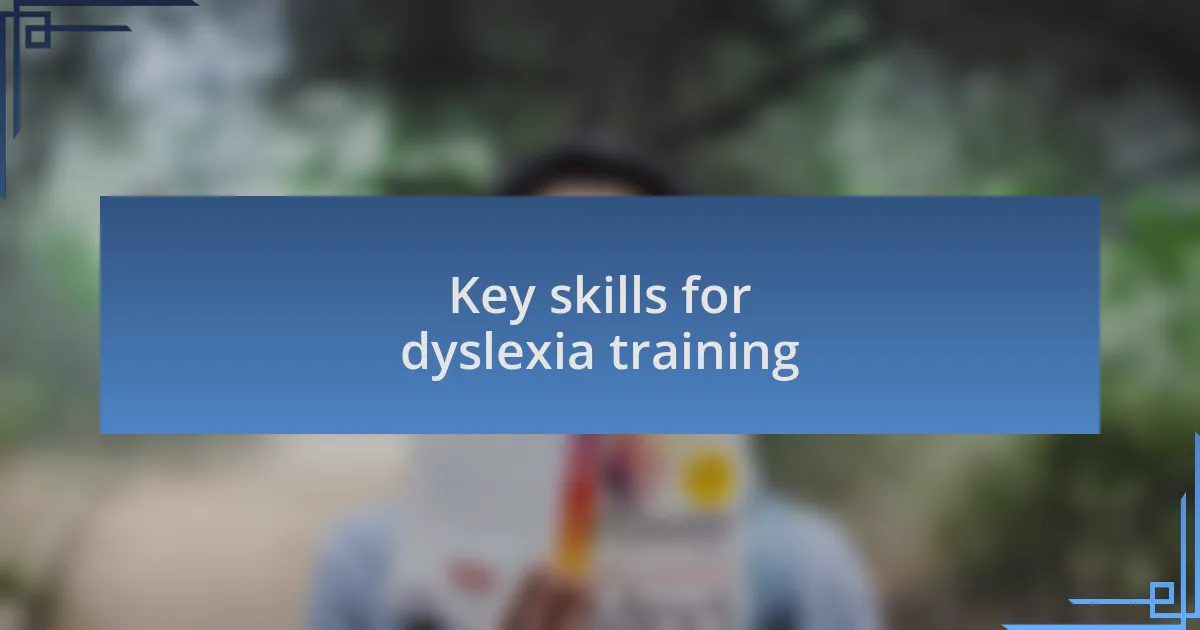
Key skills for dyslexia training
When I think about the key skills for dyslexia training, one stands out: adaptability. In my own experience, I’ve seen how effective trainers modify their approaches based on immediate feedback from their students. For instance, when certain exercises weren’t working for me, my trainer quickly shifted to a more visual technique, which resonated better. Have you ever noticed how a slight change in method can unlock a new way of understanding?
Another essential skill is patience. My journey through dyslexia wasn’t a sprint; it was more of a marathon with plenty of hurdles. There were times when I just didn’t get it, despite my efforts. My trainer’s consistent encouragement made me feel safe to ask questions and revisit concepts. It’s crucial to have someone who understands that learning isn’t linear, right?
Lastly, communication is paramount in dyslexia training. I recall a day when my instructor took the time to explain the reasoning behind certain strategies. This didn’t just clear up confusion; it empowered me. Understanding why we use specific techniques can make a world of difference in building confidence. Have you found that knowing the “why” behind your learning strategies has encouraged you to dive deeper into the material?
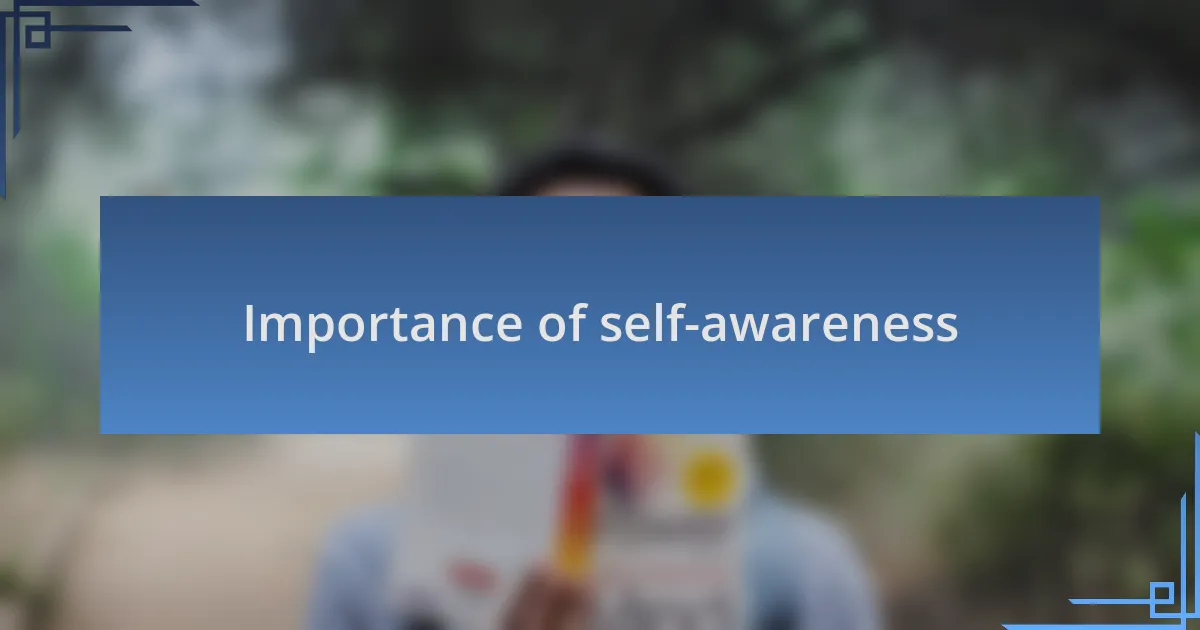
Importance of self-awareness
Self-awareness is the cornerstone of effective learning, especially when navigating dyslexia. In my journey, I learned that recognizing my challenges allowed me to advocate for the strategies that worked best for me. Have you ever taken a moment to reflect on your individual learning style? This reflection can reveal hidden strengths and areas for improvement.
Understanding my own thought processes significantly influenced my learning experience. I vividly remember the moment I realized I could visualize concepts in my mind. That simple awareness transformed my approach, allowing me to request more visual aids from my trainer. How often do we underestimate the power of self-knowledge in enhancing our educational journey?
Moreover, self-awareness fosters a sense of control and ownership over one’s learning. When I acknowledged the specific distractions that hindered my focus, I began to take proactive steps to address them. This realization not only boosted my confidence but also enriched my interactions with my trainer. Have you experienced a similar shift in mindset when you became more aware of your learning environment? Embracing self-awareness can truly empower us on our paths to success.
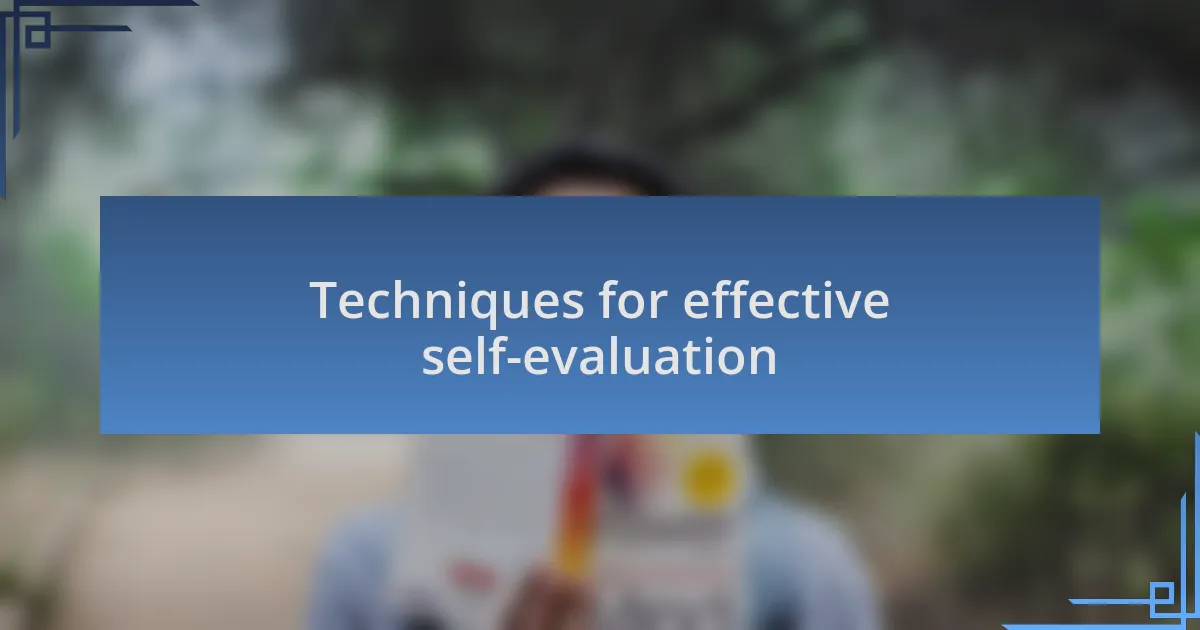
Techniques for effective self-evaluation
One effective technique for self-evaluation is to keep a learning journal. I found that jotting down my thoughts after each study session helped me identify what strategies worked well and which ones didn’t. Have you ever noticed patterns in your learning habits? This practice can deliver powerful insights into your progress and areas that need adjustment.
Another approach involves seeking feedback from others. When I reached out to my peers for their thoughts on my understanding of the material, I was often surprised by their perspectives. Their insights not only highlighted gaps in my knowledge but also reinforced my strengths. Have you ever dared to ask for constructive criticism? It can be an eye-opening experience that propels you forward in your journey.
Lastly, I recommend using self-assessment tools, like quizzes or reflection questions tailored to your learning goals. After taking a quiz on comprehension, I realized I misunderstood certain concepts. Isn’t it fascinating how a simple assessment can shine a light on your learning process? Embracing such tools can enhance your self-evaluation efforts, making your learning experience more targeted and effective.

Lessons learned from my experience
The most significant lesson I’ve learned from self-evaluation is the value of embracing vulnerability. I remember a moment when I openly shared my struggles with a supportive group. Their understanding and empathy not only eased my anxieties but reminded me that growth often comes from acknowledging our challenges. Do you ever find it hard to let others see your weaknesses? I certainly did, but that experience taught me that vulnerability can strengthen connections and foster a more profound learning environment.
Another revelation came when I realized that progress isn’t always linear. There were days when I felt overwhelmed and doubted my abilities, thinking I would never overcome certain hurdles. Yet, looking back at my journal entries, I could see the small victories—the concepts I grasped, the techniques I honed. This reflection taught me that every step, no matter how small, contributes to my overall growth. Have you ever overlooked your progress because you were focused on what you hadn’t achieved yet? I learned that celebrating those small wins can ignite motivation and reinforce resilience.
Additionally, I’ve come to appreciate the power of setting realistic expectations. In the beginning, I aimed too high and set myself up for disappointment. After weeks of frustration, I adjusted my goals to be more attainable. This shift not only made my journey feel less daunting but also allowed me to savor each achievement along the way. How often do you find yourself setting the bar too high? I now understand that gradual, steady progress is what truly builds confidence and competence in learning.
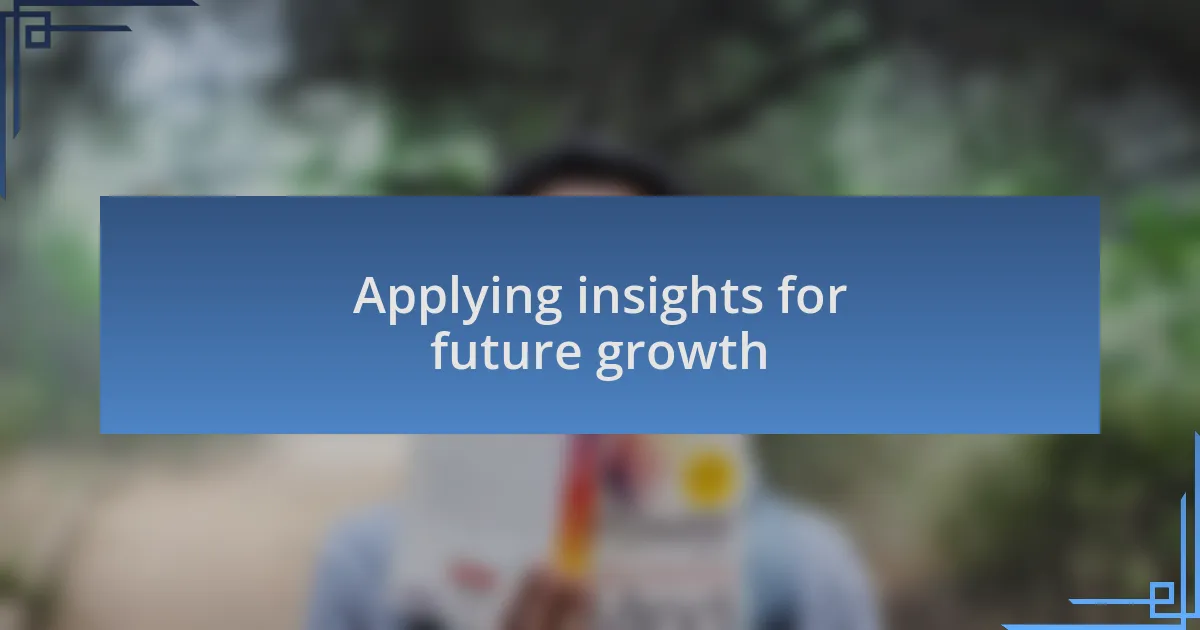
Applying insights for future growth
Once I understood my personal growth insights, I realized it was essential to take actionable steps toward applying them. One time, I created a weekly reflection routine where I assessed my progress and setbacks in real-time. This process helped me to identify areas for improvement, allowing me to recalibrate my strategies. Have you ever thought about how regularly evaluating your methods can enhance your development? It’s a game-changer.
I also discovered the value of sharing my insights with others. In one instance, I facilitated a workshop where I shared the techniques that worked for me. The feedback I received was incredibly encouraging, and I was surprised to find that my experiences resonated with others. By opening the floor for discussion, I not only solidified my understanding of those concepts but also gained diverse perspectives that enriched my own approach. How often do we underestimate the power of collaboration in personal growth?
Emotional resilience became a cornerstone of my journey as well. During challenging times, I found myself connecting deeply with my goals by visualizing the outcomes I desired. The clarity of my vision often pushed me through moments of self-doubt. Have you ever envisioned your success in vivid detail? It’s incredible how that mental imagery can keep you motivated and focused on the next steps to achieve your goals.